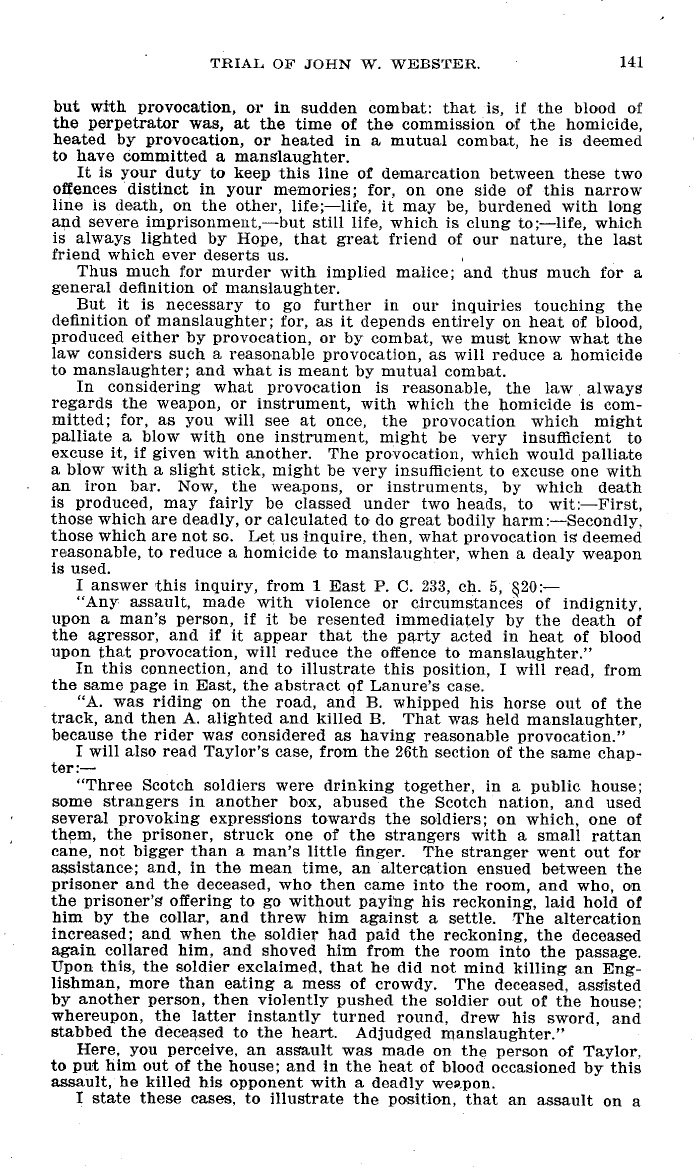|
TRIAL OF JOHN W. WEBSTER. 141
but with provocation, or in sudden combat: that is, if the blood of
the perpetrator was, at the time of the commission of the homicide,
heated by provocation, or heated in a mutual combat, he is deemed
to have committed a manslaughter.
It is your duty to keep this line of demarcation between these two
offences distinct in your memories; for, on one side of this narrow
line is death, on the other, life; life, it may be, burdened with long
and severe imprisonment,-but still life, which is clung to; life, which
is always lighted by Hope, that great friend of our nature, the last
friend which ever deserts us.
Thus much for murder with implied malice; and thus much for a
general definition of manslaughter.
But it is necessary to go further in our inquiries touching the
definition of manslaughter; for, as it depends entirely on heat of blood,
produced either by provocation, or by combat, we must know what the
law considers such a reasonable provocation, as will reduce a homicide
to manslaughter; and what is meant by mutual combat.
In considering what provocation is reasonable, the law always
regards the weapon, or instrument, with which the homicide is com-
mitted; for, as you will see at once, the provocation which might
palliate a blow with one instrument, might be very insufficient to
excuse it, if given with another. The provocation, which would palliate
a blow with a slight stick, might be very insufficient to excuse one with
an iron bar. Now, the weapons, or instruments, by which death
is produced, may fairly be classed under two heads, to wit: First,
those which are deadly, or calculated to do great bodily harm: Secondly,
those which are not so. Let us inquire, then, what provocation is deemed
reasonable, to reduce a homicide to manslaughter, when a dealt' weapon
is used.
I answer this inquiry, from 1 East P. C. 233, ch. 5, X20:
"Any assault, made with violence or circumstances of indignity,
upon a man's person, if it be resented immediately by the death of
the agressor, and if it appear that the party acted in heat of blood
upon that provocation, will reduce the offence to manslaughter."
In this connection, and to illustrate this position, I will read, from
the same page in East, the abstract of Lanure's case.
"A. was riding on the road, and B. whipped his horse out of the
track, and then A. alighted and killed B. That was held manslaughter,
because the rider was considered as having reasonable provocation."
I will also read Taylor's case, from the 26th section of the same chap-
ter:-
"Three Scotch soldiers were drinking together, in a public house;
some strangers in another box, abused the Scotch nation, and used
several provoking expressions towards the soldiers; on which, one of
them, the prisoner, struck one of the strangers with a small rattan
cane, not bigger than a man's little finger. The stranger went out for
assistance; and, in the mean time, an altercation ensued between the
prisoner and the deceased, who then came into the room, and who, on
the prisoner's offering to go without paying his reckoning, laid hold of
him by the collar, and threw him against a settle. The altercation
increased; and when the soldier had paid the reckoning, the deceased
again collared him, and shoved him from the room into the passage.
Upon this, the soldier exclaimed, that he did not mind killing an Eng-
lishman, more than eating a mess of crowdy. The deceased, assisted
by another person, then violently pushed the soldier out of the house;
whereupon, the latter instantly turned round, drew his sword, and
stabbed the deceased to the heart. Adjudged manslaughter."
Here, you perceive, an assault was made on the person of Taylor,
to put him out of the house; and in the heat of blood occasioned by this
assault, he killed his opponent with a deadly weapon.
I state these cases, to illustrate the position, that an assault on a
|

